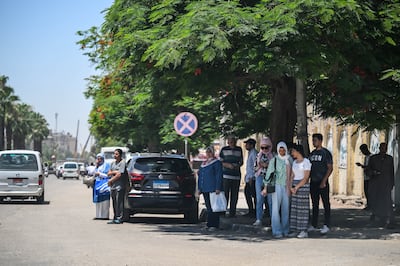A heatwave across most of Egypt has reignited a debate over the mass felling of trees by authorities in Cairo.
The chopping down of trees in Cairo has been carried out to make way for infrastructure projects such as widening roads or building overpasses to serve the 25 million residents of the city.
Environmental campaigners argue the felling of trees has contributed to the disappearance of a significant part of the city’s green areas.
The move has angered activists who see trees as an absolute necessity in a vast metropolis plagued by chronic traffic congestion.
The current heatwave, which saw Cairo temperatures reach over 40ºC, and rolling power cuts now expected to last until late July have combined to revive the conversation on the trees, feeding popular discontent and raising questions over government policies amid an economic crisis.

Activists claim some of the trees that were cut down were 30 metres high or over 100 years old. Such trees, they argue, had offered shade in summer, and mitigated pollution levels in the city.
They claim that felling trees, together with the subsequent effect on the environment, breaches the constitution and environmental laws.
Article 45 of Egypt's constitution says that “the state shall protect and develop the green space in the urban areas; preserve plant, animal and fish resources”. It adds that “every person has the right to a sound healthy environment. Environment protection is a national duty”.
In some cases, recently built overpasses are so close to apartment towers that residents can touch their railings from their windows. The large Cairo suburbs of 6th of October and Sheikh Zayed to the West of the city are examples of what residents see as random policy.
The high-end suburbs dotted with gated communities saw thousands of square metres of public spaces converted to eateries, cafes and petrol stations over the past five years, completely altering their quiet character.
The government’s response to social media campaigns against felling trees has varied between categorical denials or promises that plans are afoot to plant more trees than those being cut down. The government said more than 46,000 trees were already planted in the nation’s new capital in the desert east of Cairo.
Environment Minister Yasmine Fouad said the government plans to plant about 100 million trees, with 12 million planted in the past 18 months.
Such comments have infuriated rather than calmed climate activists and opponents.

“How can the response of the government to the campaign against the massacre of trees that has relentlessly continued for seven years be ‘we will plant 10 times the number of trees we cut down’?” Ahmed Ellabbad, one of Egypt’s top book cover artists, wrote on Facebook.
“Is this a government that we should be feeling safe about its management of any issue, or believe that it’s actually a real government?” he asked rhetorically.
The exact number of trees felled in Cairo in recent years is unknown, with environmental activists using different figures and measurements. However, there is an agreement that the primary area affected is Heliopolis, a once-leafy suburb.
Ahmed El Seidi, an environmental lawyer, estimates that the loss of green areas, including trees, in the whole city to be about 94,000 acres by the end of 2020. The figure is significantly higher now, he believes.
Michel Hanna, an environmental activist, says a total of about 400,000 square metres of green areas disappeared in Heliopolis between August 2019 and January 2020. In their place, he says, authorities significantly widened usually traffic-congested roads and built several overpasses.
Mr Hanna, a Heliopolis resident, said many of the trees felled in the suburb and elsewhere in Cairo were imported from Africa and Asia over decades predating the toppling of the monarchy in 1953.
A pharmacist by profession, he named the roads in Heliopolis where authorities felled trees. He claimed that some of them were side streets with moderate traffic and did not need to be widened.
He said trees and green areas were in some cases sacrificed for reasons other than the construction of overpasses or bigger roads; street cafes, petrol stations and multistorey car parks.

In 2021, Mr Hanna and other activists successfully saved trees near a popular Heliopolis park by plastering their trunks with flyers bearing the names of prominent Egyptian figures past and present, including President Abdel Fattah El Sisi and two of his predecessors, Anwar Sadat and Gamal Abdel Nasser.
Another success story came also in 2021, when Mr El Seidi successfully stopped authorities in the Nile Delta province of Gharbiyah from auctioning off 1,500 trees to businessmen who planned to fell them for timber after he filed a complaint to the country's chief prosecutor.
However, a court case brought by Mr El Seidi and others demanding that authorities desist from felling trees was rejected last year by a tribunal that rules on complaints against the government.
He has turned his attention to building up opposition to the felling of trees.
An online petition has been signed by about 1,000 people. He said petitions mirroring the number of those who signed it online will be presented to the government at a later date yet to be decided.
“If we all sign, then we will be able to send a strong message to the decision makers that these environmental issues are important to us and to the future of our children.”
“In the current heatwave, it’s natural that people should seek shelter in the shade of trees or find a breath of fresh air,” said Mr El Seidi, who, together with Mr Hanna, believes that temperatures can be as much as 10 degrees cooler in the shade of trees than when exposed directly to the sun.


